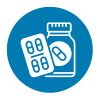Recovery From Substance Use Disorder is Possible
Recovery from substance use disorder (SUD) is not only possible but achievable with the right support, resources, and commitment. Recovery from problematic substance use is a process of change that may or may not include total abstinence as a goal. Recovery has many pathways, and while the road to recovery may be challenging, it offers hope for individuals and their loved ones affected by opioid addiction.
Treatment and Recovery Options
Overcoming an SUD is not as simple as resisting the temptation to take drugs. Like many other chronic conditions, treatment is available for substance use disorders. While no single treatment method is right for everyone, recovery is possible, and help is available for patients with SUDs.

| .png) | .png) | .png) |
Medications for opioid use disorder (MOUD)
| Outpatient counseling
| Inpatient rehabilitation
| Behavioral health care
|
Specific conditions like opioid use disorder may require medication as the first course of treatment. MOUD can help with cravings and withdrawal symptoms.
| Helps people understand addiction, their triggers, and their reasons for using drugs. This form of treatment can be done at a doctor’s office or via telehealth appointment.
| A full-time facility provides a supportive environment to help people recover without distractions or temptations.
| Trained providers who help with mental health concerns.
|
Reducing Stigma is Important
Addiction can happen to anyone.
SUD is a treatable, chronic disease that can affect people of any race, gender, income level, or social class. No one driving factor leads to SUD. Some people may use drugs to help cope with stress and trauma or to help with mental health issues. Some may develop a SUD after misusing opioids that are prescribed to them by doctors. In any case, using drugs over time may cause changes in a person’s brain, leading to intense cravings and continued use.
Some may view acknowledging and receiving treatment for an SUD as a sign of personal failure and weakness. The associated shame felt by patients and families can make it difficult to seek treatment. Finding a doctor who is comfortable discussing SUDs can help ensure long-term recovery.
What to Look for in SUD Treatment
What are qualities in a healthcare provider that you might want to look for when seeking SUD treatment?
- Actively listens
- Engages in a nonjudgmental way
- Treats patients with respect and addresses their SUD as a medical condition
- Helps patients understand they will help them get the treatment they need, and recovery is possible
Overcoming Challenges
Recovery from opioid use disorder may not be linear, and individuals may face challenges and setbacks along the way. Relapse is a common occurrence in addiction recovery, but it does not signify failure. Instead, it serves as an opportunity to learn and grow, reevaluate treatment strategies, and recommit to recovery goals.
Resources
CDC: Recovery Is Possible for Everyone: Understanding Treatment of Substance Use Disorders
Illinois Department of Healthcare and Family Services: Substance Use Prevention Recovery Services
SAMHSA: Recovery and Recovery Support
